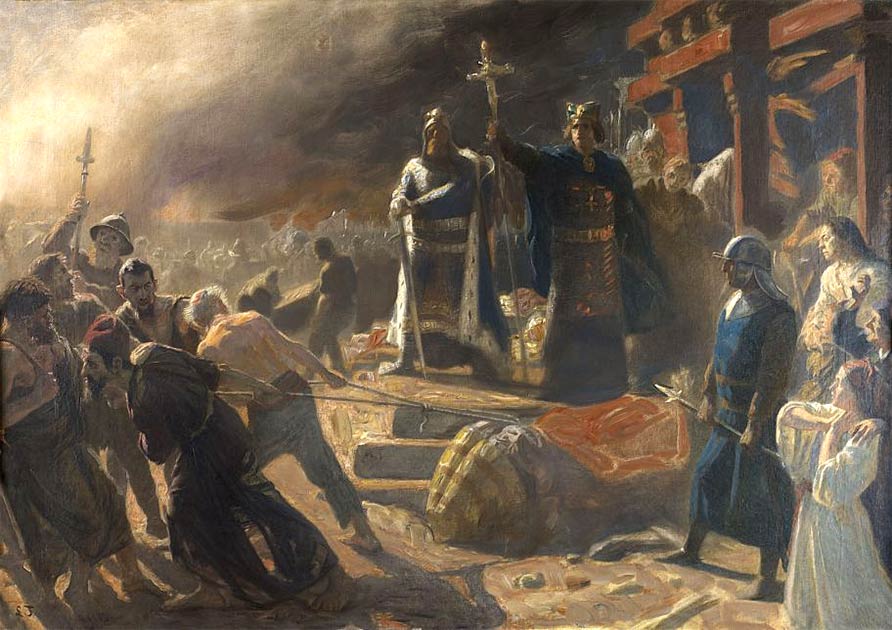Gallery
Photos from events, contest for the best costume, videos from master classes.
 |  |
 |  |
 |  |
 |  |
 | :max_bytes(150000):strip_icc()/Idolatry1723x1331-56a1483c3df78cf772692762.jpg) |
 |  |
Valentine’s Day also lacks any real religious origin. Christmas, Halloween, and Easter can all be traced back to various ancient pagan and Christian traditions. The true origin of Valentine’s Day is outside the Bible and early Christian literature. Christians who may be tempted to compromise need to ask themselves if the origins of Valentine’s Day are biblical or pagan. It is not too hard to figure that out. Even the old World Book Encyclopedia (Valentine’s Day. Volume 19. 1966, pp.205-206) states, While Pope Gelasius officially condemned the pagan Roman festival and banned its observance, many of its accompanying practices quickly appeared in a newly established holiday added by him to the official church list of feast days in A.D. 496—St. Valentine’s Day. Valentine's Day is no longer part of the official liturgical calendar of any Christian church; it was dropped from the Catholic calendar in 1969. Its not a feast, a celebration, or a memorial of any martyrs. This culminated in 496 AD when Pope Gelasius I officially established February 14 as St. Valentine's Day, honoring a Christian martyr known for performing secret marriages and showing compassion in defiance of Roman law (History, 2025). The fortieth day after January 6 - Nimrod’s original birth date - takes us to February 15 th, the celebration of which began on the evening of February 14 th, the Lupercalia or St. Valentine’s Day! On this day in February, Semiramis, the mother of Nimrod, was said to have been purified and to have appeared for the first time in public with We can see this distortion of history on social media where a post regularly making the rounds “explains” that St. Valentine’s Day is simply a pagan holiday in flimsy Christian cover (there seems to be a secular humanist template for “debunking” Christian holidays as paganism warmed over – Christmas, Easter, St. Valentine’s The issue here is not with St. Valentine, or with dedicating a day to the spirit of Love, but with participating in pagan holidays. In the "mainstream" sense, we still worship Cupid (the Roman God of Erotica) and (whether you notice it or not) participate in traditional pagan rituals when we're celebrating St. Valentine's Day. Origins of St. Valentine's Day . There is a lot of debate and disagreement among scholars about the origins of Valentine’s Day. We’ll probably never be able to disentangle all of the cultural and religious threads in order to reconstruct a complete and coherent story. History also records that around A.D. 500 Pope Gelasius established St. Valentine’s Day in an attempt to convert this pagan Roman fertility festival into a Christian holiday, thus retaining its attractions and making it easier for pagan people to accept Christianity. Each of these reasons is valid, and if you have another reason for debating whether or not to celebrate Valentine's Day, your reason is completely valid too. 1. Its Pagan Roots. Valentine's Day does trace back to pagan roots. Many holidays have pagan roots, yet over the course of centuries, many church leaders blended them into Christianity. If The first Valentine sent in the United States was in the 1840’s by Esther Howgald. Most of us enjoy "spoiling" a loved one on Valentine’s Day. Sending gifts and cards conveys love, affection, and friendship. There is no biblical reason why Christians should not celebrate Valentine’s Day by giving their loved ones flowers, candy and/or cards. The average person spends $152 dollars on Valentine’s Day. Now that you know the history of Valentine’s Day and how people celebrate it today, the question is can Christians celebrate it? First, let’s look at the reasons why Christians can celebrate Valentine’s Day. Why Some Christians Do Celebrate It Valentine’s day, also called Saint Valentines Day, is celebrated every February 14. Valentine’s day is when people celebrate love and The history of St. Valentine’s Day can be traced back to ancient Rome, where it is believed to have originated from a combination of pagan and Christian influences. One popular legend suggests that the day commemorates the martyrdom of St. Valentine, a Christian priest who lived during the third century under the rule of Emperor Claudius II. A bust containing relics of St. Valentine, in Poland. Wikimedia. Valentine’s Day. February 14 is commemorated as Valentine’s Day, or St. Valentine’s Day in the calendar of the Anglican and Lutheran Churches, although in the Roman Catholic Church it was relegated to local status in Calendar of Saints, removed as a feast day, “since, apart from his name, nothing is known of Saint There was a belief that that if you did not know the day a man was born, he was born on the day of his conception(the original Good Friday + 9 months is dec 25), hence Christmas. Was he actually born that day, probably not. However, it was devised independently of any pagan holiday, and any expropriation was merely incidental. From Lupercalia to Valentine’s Day. It was Pope Gelasius I in the 5 th century AD who abolished Lupercalia and replaced it with Valentine’s Day in honor of St. Valentine and as a celebration of his martyrdom. He declared February 14 as St. Valentine’s Day. On February 14, the Church celebrates the witness of Saints Cyril and Methodius—no, I did not just make a mistake. While today’s date remains in the popular culture associated with St. Valentine, a Roman priest who died sometime around the year 270, the official calendar of the Catholic Church no longer recognizes today as the Feast of St. Valentine. The Truth Behind St. Valentine’s Day St. Valentine’s Day is the world’s “holiday of love.” Since the Bible states that God is love (I John 4:8, 16), does He approve of the celebration of this day? Does He want His people—true Christians—partaking of the candy and cards, or any customs associated with this day?
Articles and news, personal stories, interviews with experts.
Photos from events, contest for the best costume, videos from master classes.
 |  |
 |  |
 |  |
 |  |
 | :max_bytes(150000):strip_icc()/Idolatry1723x1331-56a1483c3df78cf772692762.jpg) |
 |  |